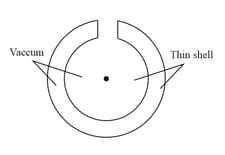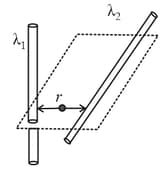Embibe Experts Solutions for Chapter: Electrostatics, Exercise 2: Exercise#2
Embibe Experts Physics Solutions for Exercise - Embibe Experts Solutions for Chapter: Electrostatics, Exercise 2: Exercise#2
Attempt the practice questions on Chapter 1: Electrostatics, Exercise 2: Exercise#2 with hints and solutions to strengthen your understanding. Practice Book for KVPY Aptitude Test - Stream SX Physics solutions are prepared by Experienced Embibe Experts.
Questions from Embibe Experts Solutions for Chapter: Electrostatics, Exercise 2: Exercise#2 with Hints & Solutions
Two small metal balls of different mass and are connected by strings of equal length to a fixed point. When the balls are given charges, the angles that the two strings make with the vertical are and respectively. The ratio is close to
Consider a cube of uniform charge density The ratio of the electrostatic potential at the centre of the cube to that at one of the corners of the cube is-
If some charge is given to a solid metallic sphere, the field inside remains zero and by Gauss's law, all the charge resides on the surface. Suppose now that Coulomb's force between two charges varies as , then for a charged solid metallic sphere,
A positive charge is placed at the centre of a neutral hollow cylindrical conducting shell with its cross-section as shown in the figure below:

Which one of the following figures correctly indicates the induced charge distribution on the conductor (ignore edge effects)?
A thin metallic disc is rotating with constant angular velocity about a vertical axis that is perpendicular to its plane and passes through its centre. The rotation causes the free electrons in the disc to redistribute. Assume that there is no external electric or magnetic field. Then,
An electrostatic field line leaves at an angle from a point charge and connects with point charge at an angle ( and are positive) (see figure below). If and , then,

The potential due to an electrostatic charge distribution is, where, is positive. The net charge within a sphere centred at the origin and of radius is,
Two mutually perpendicular infinitely long straight conductors carrying uniformly distributed charges of linear densities and are positioned at a distance from each other.

The force between the conductors depends on as,
